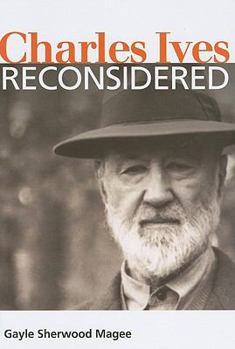Charles Ives Reconsidered
Select Format
Select Condition 
Book Overview
Charles Ives Reconsidered reexamines a number of critical assumptions about the life and works of this significant American composer, drawing on many new sources to explore Ives's creative activities within broader historical, social, cultural, and musical perspectives. Gayle Sherwood Magee offers the first large-scale rethinking of Ives's musical development based on the controversial revised chronology of his music. Using as a guide Ives's own dictum that "the fabric of existence weaves itself whole," Charles Ives Reconsidered offers several new paths to understanding all of Ives's music as the integrated and cohesive work of a controversial composer who was very much a product of his time and place. Magee portrays Ives's life, career and posthumous legacy against the backdrop of his musical and social environments from the Gilded Age to the present. The book includes contemporary portraits of the composer, his peers, and his teachers, as seen through archival materials, published reviews, and both historical and modern critical assessments.
Format:Paperback
Language:English
ISBN:0252077768
ISBN13:9780252077760
Release Date:June 2010
Publisher:University of Illinois Press
Length:231 Pages
Weight:1.00 lbs.
Dimensions:0.8" x 5.9" x 8.9"
Customer Reviews
1 rating
A New Look at Charles Ives
Published by Thriftbooks.com User , 16 years ago
The American composer Charles Ives (1874 -- 1954) has achieved something of an iconic stature. As Gayle Sherwood Magee explains in the Introduction to her recent book, "Reinventing Charles Ives" (2008) the Ives legend runs along the following lines -- to paraphrase Magee. Ives was born in Danbury, Connecticut and received an unconventional early music training from his father George, a Civil War bandleader. As a student at Yale, Ives studied with Horatio Parker but was bored with Parker's conservative approach which was based solely upon the German classics. Upon graduating from Yale, Ives created a highly modernistic, advanced body of compositions while pursuing a highly successful career in insurance. Ives's work was virtually unknown and rejected for many years, as Ives lived in musical isolation. Ives virtually stopped composing in 1918. Beginning with his receipt of a Pulitzer Prize in 1947 for his Third Symphony followed by Leonard Bernstein's resurrection of Ives's Second Symphony in the early 1950, this eccentric, reclusive American composer began at last to gain the recognition he deserved for the forward looking, modern compositions of his early years. Magee takes a fresh look at Ives and the legend. Magee is Assistant Professor of Musicology at the University of Illinois, Urbana-Champagna and the author of a research guide to Ives. Her book is part of an outstanding series of the University of Illinois Press called "Music in American Life". Magee challenges the Ives legend in a number of ways. Most importantly, she questions the view that Ives stopped composing in 1918. She argues that Ives continued to revise his works continuously through the 1920s. She finds that many works thought to anticipate modernism were in fact revised from earlier more conservative versions to give them a modernistic spirit derived from then-contemporary compositions. In other words, Ives frequently revised his works to follow modernistic trends as opposed to himself pioneering modernism in American music. Some earlier scholars had gone further than Magee by accusing Ives of predating his manuscripts to make his compositions appear earlier than they were. Magee rejects this accusation. Magee tends to downplay the importance of Ives's father George in Ives's early musical education. And she argues as well that Parker's influence and teaching exerted a much stronger influence on the composer than he was willing to acknowledge. Contrary to Ives's reputation as a recluse devoted solely to his art, Magee shows an Ives who, from his days at Yale, avidly sought to make his music popular and to gain public recognition. Ives, at least in his early years, was a substantially conservative composer. Magee maintains as well that Ives received throughout his life more recognition for his works than the legend of a neglected genius would have it. In her biography of Ives, Magee gives a portrait of a complicated person a "flawed, brilliant, naive, shrewd, in






